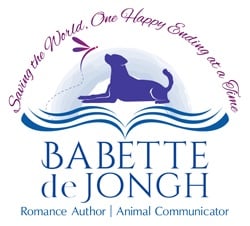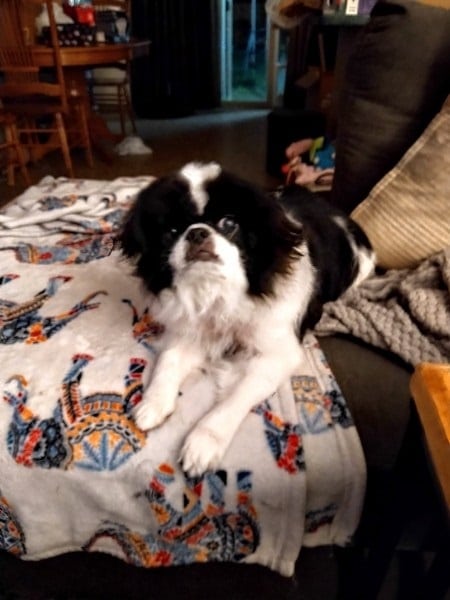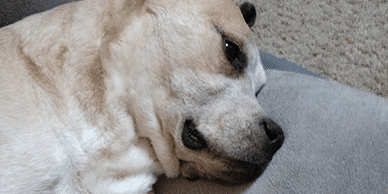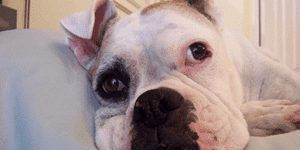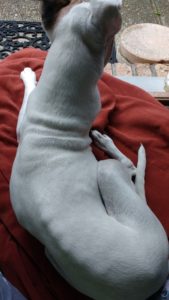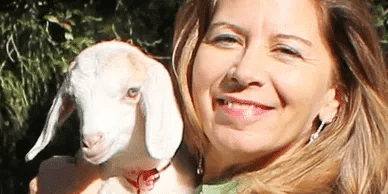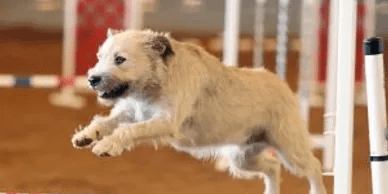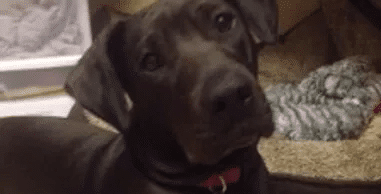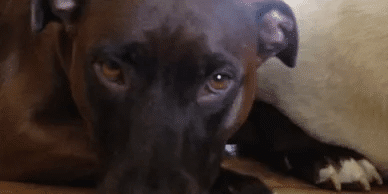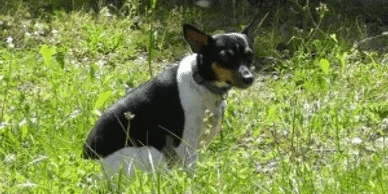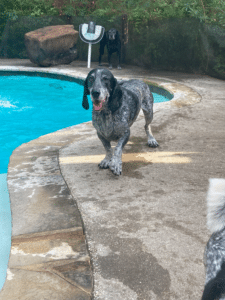 Our good dog Fred crossed the Rainbow Bridge two weeks ago. He was old, and we were lucky that he went downhill so quickly that he didn’t have to suffer for long.
Our good dog Fred crossed the Rainbow Bridge two weeks ago. He was old, and we were lucky that he went downhill so quickly that he didn’t have to suffer for long.
But even as I type this, I realize that isn’t right. Fred suffered – cheerfully – for most of his adult life. Fred was mostly basset hound, so his front ankle joints were a chronic (and unavoidable) source of pain for years – for at least half of his long-for-a-basset life.
But his greatest joy in life was playing ball, so he was willing to put up with the pain to experience the joy. We were less willing to watch him suffer than he was to suffer himself.
We tried everything.
We. Tried. Everything.
Medications. Injections. Homeopathy. Energy Healing. Infrared therapy. Alternating heat therapy with cold packs. Soaking his feet and ankles in Epsom Salt and warm water (a not-fun-for-anyone failure that ended with me apologizing to Fred and mopping the floor.) I even tried to put an ankle brace on him, which he managed to tear off in less than an hour. We tried surgical intervention more than once when his foot bones (which his deformed ankles put at an awkward angle) rubbed together causing recurring abscesses.
I’m not sure whether we were pissing money down a bottomless well, or whether some of our efforts succeeded, because no matter what we did, Fred continued to play ball with joyful abandon (whenever we allowed it) for the rest of his life.
It was all about the ballgame for Fred, and there were no winners or losers. He was always willing to cheer (or bark) when another dog caught the ball. When Jed got the ball, Fred gave a long, lamenting yodel, because he knew Jed would hog the ball until he decided to let it go. When Georgia caught the ball, Fred gave a series of encouraging “yip-yip-yips” so she wouldn’t dawdle on the way back to deliver the ball for another toss. When the other dogs declined to follow the ball into the pool, Fred would stand on the retaining wall five feet above the water and dive in with the grace of a prima ballerina, sometimes catching the ball in his mouth on the way down.
Fred was always eager to chase the ball. Even after he stopped eating, or even drinking water, he couldn’t wait to go outside and play ball. But Fred’s liver was failing, and there’s no good prognosis for that. The day Fred said, “I’m done,” our kids who lived close enough to come home and see Fred one more time made travel arrangements.
I had always thought that the day Fred refused to play ball would be the day he was ready to leave his body behind and cross the bridge to the other world. But you know what? Even after he quit eating food and drinking water, he still said yes to playing ball. That dog found joy in chasing the ball, even the day we finally helped him cross over the Rainbow Bridge. He wasn’t eating. He wasn’t drinking. His body was nothing but skin and bones. But he still wanted to play ball.
If Fred could have left this world playing ball, that’s how he would’ve chosen to go. If Fred could’ve chosen for himself, he’d have had someone toss the ball for him all day long for the last days of his life until his legs refused to carry him, and his heart quit pumping. That’s how much Fred loved to play ball.
For the last year, Fred had been under strict rules of “only five throws” per session, and only three sessions per day, because with any more than that, Fred’s poor old legs wouldn’t be able to walk down the stairs for the last potty of the evening, much less walk back up the stairs again afterward. We were happy to carry him up and down the stairs, but we tried to avoid that by limiting Fred’s ball time. He was willing to accept pain we weren’t willing to witness, but we were adamant that he had to accept his limitations, so he had no other choice.
One of the reasons it’s so hard to determine when our animal companions are ready to leave their body and cross the Rainbow Bridge is that they are still able to experience joy, even after their bodies have failed them. They are still able to love what they love with total abandon. They are still able to express gratitude, still able to envelop us in their love, even as their hearts … stop.
Fred was just a dog. He was just a dog, who, like many other dogs, loved to play ball. Like many other dogs, he was passionate about the one thing he loved more than anything else. I even wonder if he loved playing ball more than he loved us, and I think that maybe the answer to that uncomfortable question is yes. I do know that many people over the years have fallen in love with Fred, and many have asked if we were willing to let him go home with them. We weren’t willing, because Fred was meant to be our dog for the rest of his days, and so he was.
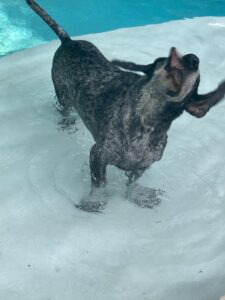
Because we humans need that, don’t we? We need the ability to determine the things that give us the most joy, and we need the determination to pursue those things as long as our hearts still pump blood to our lungs, and we still have the breath to do it.
I have been able to identify the things that give me joy. I love to write. I love to create art. I love to communicate with animals. I love to send energy healing to those who wish to accept it. I love to spend time with loved-ones and friends. I love to putter in the garden, even though I know my efforts will quickly be undone. But I must admit that I put a value-judgment on those things that give me joy. I feel that I should put more time and energy into things that make money, or things that result in admiration or approval, or things that once done, can’t be undone.
Fred didn’t worry about quantifying any results that his joy in playing ball may have produced. He didn’t care what anyone thought of his joyful mission to chase or catch the ball. He loved what he loved, and he pursued his passion without explanation or apology.
We humans may think that chasing a ball is stupid and pointless. But Fred didn’t care what we thought. He loved what he loved, and he didn’t let anyone’s opinion stop him from going after the thing that gave him the most joy in life.
May we all be able to learn from Fred that joy matters. Our joy doesn’t have to make money or gain approval or do anything other than make us happy. May we all learn from Fred that joy is important and worth pursuing, without explanation or apology. May we all pursue our joy until the moment that our hearts … stop.
Fred didn’t write a book or build a business empire or create a work of art that will hang in a museum to gather dust and inspire others. Fred chased—and caught—the thing that gave him joy, every day of his life.
May we all learn from Fred how to do the same thing for ourselves.
